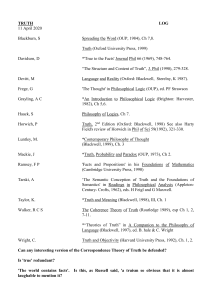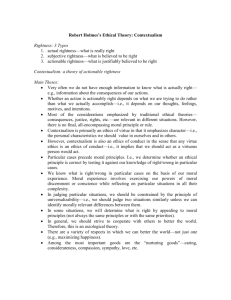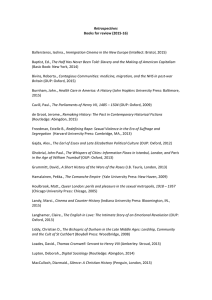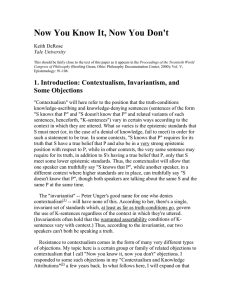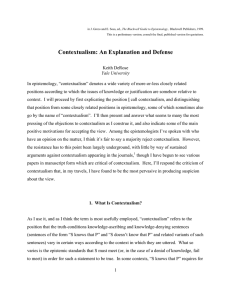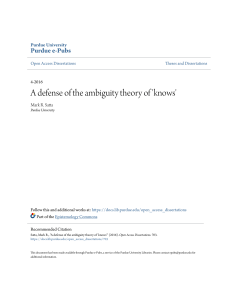Philosophy Prelim: Syllabus. Context Sensitivity in Semantics. Adam Booth. Spring, 2006.
advertisement
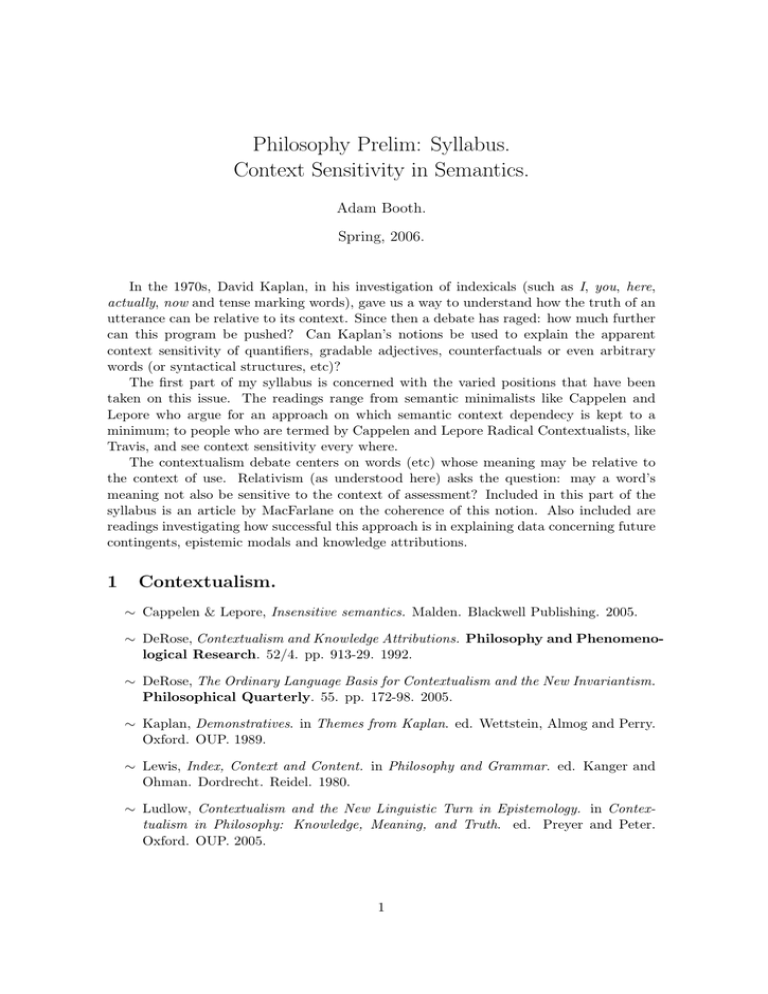
Philosophy Prelim: Syllabus. Context Sensitivity in Semantics. Adam Booth. Spring, 2006. In the 1970s, David Kaplan, in his investigation of indexicals (such as I, you, here, actually, now and tense marking words), gave us a way to understand how the truth of an utterance can be relative to its context. Since then a debate has raged: how much further can this program be pushed? Can Kaplan’s notions be used to explain the apparent context sensitivity of quantifiers, gradable adjectives, counterfactuals or even arbitrary words (or syntactical structures, etc)? The first part of my syllabus is concerned with the varied positions that have been taken on this issue. The readings range from semantic minimalists like Cappelen and Lepore who argue for an approach on which semantic context dependecy is kept to a minimum; to people who are termed by Cappelen and Lepore Radical Contextualists, like Travis, and see context sensitivity every where. The contextualism debate centers on words (etc) whose meaning may be relative to the context of use. Relativism (as understood here) asks the question: may a word’s meaning not also be sensitive to the context of assessment? Included in this part of the syllabus is an article by MacFarlane on the coherence of this notion. Also included are readings investigating how successful this approach is in explaining data concerning future contingents, epistemic modals and knowledge attributions. 1 Contextualism. ∼ Cappelen & Lepore, Insensitive semantics. Malden. Blackwell Publishing. 2005. ∼ DeRose, Contextualism and Knowledge Attributions. Philosophy and Phenomenological Research. 52/4. pp. 913-29. 1992. ∼ DeRose, The Ordinary Language Basis for Contextualism and the New Invariantism. Philosophical Quarterly. 55. pp. 172-98. 2005. ∼ Kaplan, Demonstratives. in Themes from Kaplan. ed. Wettstein, Almog and Perry. Oxford. OUP. 1989. ∼ Lewis, Index, Context and Content. in Philosophy and Grammar. ed. Kanger and Ohman. Dordrecht. Reidel. 1980. ∼ Ludlow, Contextualism and the New Linguistic Turn in Epistemology. in Contextualism in Philosophy: Knowledge, Meaning, and Truth. ed. Preyer and Peter. Oxford. OUP. 2005. 1 ∼ MacFarlane, Semantic Minimalism and Non-Indexical Contextualism. forthcoming in Content and Context: Essays on Semantics and Pragmatics. ed. Preyer and Peter. ∼ Neale, Section 3 of Pragmatism and Binding. in Semantics versus pragmatics. ed. Szabó. Oxford. OUP. 2005. ∼ Perry, Thought without Representation. Proceedings of the Aristotelian Society. 60. pp. 263-83. 1986. ∼ Predelli, Painted Leaves, Context, and Semantic Analysis. Linguistics and Philosophy. 28/3 pp. 351-74. 2005. ∼ Recanati, Literalism and Contextualism: some Varieties. in Contextualism. ed. Preyer. Oxford. OUP. 2003. ∼ Richard, Contextualism and Relativism. Philosophical Studies. 119/1 − 2. pp. 215-42. 2004. ∼ Stanley, Semantics in Context. in Contextualism. ed. Preyer. Oxford. OUP. 2003. ∼ Szabó, Sensitivity training. Forthcoming. ∼ Travis, On What is Strictly Speaking True. Canadian Journal of Philosophy. 15/2. pp. 187-229. 1985. 2 Relativism. ∼ Belnap & Green, Indeterminism and the Thin Red Line. in Philosophical Perspectives, 8: Logic and Language. pp. 365-388. 1994. ∼ Egan, Hawthorn & Weatherson, Epistemic Modals in Context. in Contextualism in Philosophy Knowledge, Meaning, and Truth. ed. Preyer and Peter. Oxford. OUP. 2005. ∼ DeRose, Can It Be That it Would Have Been Even Though It Might Not Have Been Nos. 13/3. pp. 385-413. 1999. ∼ DeRose, Epistemic Possibility. The Philosophical Review. 100. pp. 581-605. 1991. ∼ MacFarlane, Making Sense of Relative Truth. Proceedings of the Aristotelian Society. 105. pp. 321-39. 2005. ∼ MacFarlane, Future Contingents and Relative Truth. The Philosophical Quarterly. 53. pp. 321-36. 2003. ∼ MacFarlane, The Assessment Sensitivity of Knowledge Attribution. in Oxford Studies in Epistemology 1. ed. Gendler and Hawthorne. Oxford. Oxford University Press. 2005. 2
